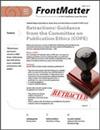几何缺陷对立体光刻制造的周期性多孔吸收材料声传输特性的影响
IF 0.4
4区 工程技术
Q4 ACOUSTICS
引用次数: 0
摘要
增材制造允许制造具有以前无法实现的微观和宏观结构复杂性的声学材料。然而,对增材过程中出现的各种几何缺陷的理解仍处于初级阶段,这仍然是准确预测这种复杂吸收剂声学行为的障碍。在这项研究中,我们展示了我们使用混合微观-宏观多物理场方法对使用立体光刻(SLA)技术制造的周期性多孔吸收剂的吸收行为进行数值模拟的结果。具体来说,我们的重点是了解在SLA过程中固体韧带的膨胀或收缩对最终打印样品的声学性能所起的作用。首先,使用COMSOL多物理场对周期吸波器进行建模,其中使用微观建模方法推导输运性质,使用Johnson-Champoux-Allard-Lafarge-Pride半经验模型推导吸声行为。然后,从扩张研究的结果指导韧带大小的变化在单位细胞模型。最后,用阻抗管测试了制备的样品,并将测量的吸收特性与先验数值预测进行了比较。结果表明,在数值模拟模式中考虑制造缺陷可以为增材制造的多孔吸声器提供可靠的吸声预测。本文章由计算机程序翻译,如有差异,请以英文原文为准。
Effect of geometrical defects on the acoustical transport properties of periodic porous absorbers manufactured using stereolithography
Additive manufacturing allows the fabrication of acoustical materials with previously unrealizable micro- and macrostructural complexities. However, the still nascent understanding of various geometrical defects occurring during the additive process remains a barrier to accurately predicting the acoustical behavior of such complex absorbers. In this study, we present the results from our efforts on numerically modeling the absorption behavior of periodic porous absorbers fabricated using the stereolithography (SLA) technique using the hybrid micro-macro multiphysics approach. Specifically, we focus on understanding the role played by the expansion or shrinkage of the solid ligaments during the SLA process on the acoustical properties of the final printed samples. First, the periodic absorbers are modeled using COMSOL multiphysics, where the transport properties are derived using the micro-modeling method and sound absorption behavior using the Johnson-Champoux-Allard-Lafarge-Pride semi-empirical model. Then, results from the expansion study guide the changes in the ligament sizes in the unit cell modeling. Finally, the fabricated samples are tested using an impedance tube, and the measured absorption properties are compared to the a priori numerical predictions. Results indicate that accounting for fabrication defects within the numerical modeling schema can provide reliable sound absorption predictions for additively manufactured porous absorbers.
求助全文
通过发布文献求助,成功后即可免费获取论文全文。
去求助
来源期刊

Noise Control Engineering Journal
工程技术-工程:综合
CiteScore
0.90
自引率
25.00%
发文量
37
审稿时长
3 months
期刊介绍:
NCEJ is the pre-eminent academic journal of noise control. It is the International Journal of the Institute of Noise Control Engineering of the USA. It is also produced with the participation and assistance of the Korean Society of Noise and Vibration Engineering (KSNVE).
NCEJ reaches noise control professionals around the world, covering over 50 national noise control societies and institutes.
INCE encourages you to submit your next paper to NCEJ. Choosing NCEJ:
Provides the opportunity to reach a global audience of NCE professionals, academics, and students;
Enhances the prestige of your work;
Validates your work by formal peer review.
 求助内容:
求助内容: 应助结果提醒方式:
应助结果提醒方式:


